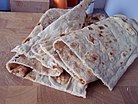Aloo paratha
 Aloo paratha with yogurt and pickle | |
| Alternative names | Alur Porota in Bengali Alu Parata in Odia Alu ko parautha in Nepali Batata na Parotha in Gujarati |
|---|---|
| Region or state | Indian subcontinent[1] |
| Associated cuisine | Indian, Pakistani, Bangladeshi |
| Main ingredients | Potato, atta, maida, butter or ghee |
| 290-360 kcal (-1217 kJ) | |
Aloo paratha (Hindi: आलू पराठा, Bengali: আলুর পরোটা, Nepali: आलु परौठा, Gujarati: બટાકા ના પરોઠા, Odia: ଆଳୁ ପରଟା, Punjabi: ਆਲੂਆਂ ਦਾ ਪਰੌਠਾ, Urdu: آلو پراٹھا, lit. 'potato paratha') is a paratha (flat bread dish) stuffed with potato filling native to the Indian subcontinent.[2][3] It is traditionally eaten for breakfast.[2][4]
It is made using unleavened dough rolled with a mixture of mashed potato and spices (amchur, garam masala) which is cooked on a hot tawa with butter or ghee.[5][6] Aloo paratha is usually served with butter, chutney, curd, or Indian pickles.[7][8]
Being stuffed with potato and fried makes it higher in calories (290-360 calories) than a typical roti (60 calories).[6]
In the 21st century, due to convenience, working routines, rising household incomes, smaller families and time restrictions, the aloo paratha breakfast for urban Indians has been increasingly replaced by foods seen as more convenient such as cereals.[4] A similar pattern has been observed among Central Valley Sikhs in America.[2]
Variations
[edit]Jammu Aloo Anardana or Aloo Daḍuni paratha
[edit]Jammu is known for Aloo parathas stuffed with a local variety of pomegranate seeds called Daḍuni. These parathas form a regular part of a typical Dogra breakfast and are readily available in any Dogri Vaishno Dhaba on the way to the Shri Vaishno Devi shrine.[9]
Jodhpuri Jayaphali Aloo Palak paratha
[edit]In Rajasthan, Jodhpur is known for aloo parathas stuffed with special filling of potatoes cooked with jayaphal (nutmeg) and palak (spinach).[10]
Mode of serving
[edit]Aloo parathas are mostly served as a breakfast dish along with dahi (plain yogurt), or yogurt dips called raita. Sometimes, Athana (Indian pickle), chutney and masala chai are also served along with it.[11]
See also
[edit]References
[edit]- ^ Kumawat, Lovesh (2020). Cuisine. NotionPress. p. 103. ISBN 9781648501623.
- ^ a b c Benson, Heather L.; Helzer, Jennifer (January 2017). "Central Valley Culinary Landscapes: Ethnic Foodways of Sikh Transnationals". California Geographer. 56: 55–95.
- ^ Al-Khusaibi, Mohammed; Rahman, Mohammad Shafiur (2019). "1. Traditional foods: overview". In Al-Khusaibi, Mohammed; Al-Habsi, Nasser; Rahman, Mohammad Shafiur (eds.). Traditional Foods: History, Preparation, Processing and Safety. Switzerland: Springer. pp. 1–8. ISBN 978-3-030-24620-4.
- ^ a b Iyer, Lakshmi Shankar (8 June 2014). "A Study of Breakfast Habits of Urban Indian Consumers". The International Journal's Research Journal of Economics and Business Studies. 3 (8): 107–118. ISSN 2251-1555.
- ^ Basak, Somnath; Chakraborty, Snehasis; Singhal, Rekha S. (1 January 2023). "Revisiting Indian traditional foods-A critical review of the engineering properties and process operations". Food Control. 143: 109286. doi:10.1016/j.foodcont.2022.109286. ISSN 0956-7135. S2CID 251334687.
- ^ a b Padave, Chef Priya; Sawant, Chef Vijay; Salvi, Chef Swapnil. Indian Bread: Traditional and Innovative Indian Breads. Educreation Publishing. pp. 25–32. ISBN 978-93-5373-066-6.
- ^ Ananthanarayan, Laxmi; Dubey, Kirti Kumari; Muley, Abhijeet B.; Singhal, Rekha S. (2019). "6. Indian traditional foods: preparation, processing and nutrition". In Al-Khusaibi, Mohammed; Al-Habsi, Nasser; Rahman, Mohammad Shafiur (eds.). Traditional Foods: History, Preparation, Processing and Safety. Switzerland: Springer. p. 135. ISBN 978-3-030-24620-4.
- ^ Sachdev, M; Misra, A (17 January 2022). "Heterogeneity of Dietary practices in India: current status and implications for the prevention and control of type 2 diabetes". European Journal of Clinical Nutrition. 77 (2): 145–155. doi:10.1038/s41430-021-01067-1. PMID 35039630. S2CID 245988005.
- ^ Kapoor, Sanjeev. "How to make Jammu Ka Aloo Anardana Parantha, recipe by MasterChef Sanjeev Kapoor". sanjeev kapoor. Retrieved 7 April 2023.
- ^ "Aloo Palak Parantha (Jodhpuri Parantha) Recipe On Plattershare". www.plattershare.com. 11 May 2022. Retrieved 3 May 2023.
- ^ Nayak, Hari (16 April 2012). My Indian Kitchen: Preparing Delicious Indian Meals without Fear or Fuss. Tuttle Publishing. ISBN 978-1-4629-0637-6.

